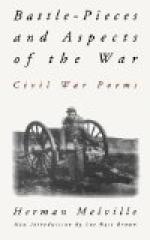In this view, what Northern writer, however patriotic, but must revolt from acting on paper a part any way akin to that of the live dog to the dead lion; and yet it is right to rejoice for our triumph, so far as it may justly imply an advance for our whole country and for humanity.
Let it be held no reproach to any one that he pleads for reasonable consideration for our late enemies, now stricken down and unavoidably debarred, for the time, from speaking through authorized agencies for themselves. Nothing has been urged here in the foolish hope of conciliating those men—few in number, we trust—who have resolved never to be reconciled to the Union. On such hearts every thing is thrown away except it be religious commiseration, and the sincerest. Yet let them call to mind that unhappy Secessionist, not a military man, who with impious alacrity fired the first shot of the Civil War at Sumter, and a little more than four years afterward fired the last one into his own heart at Richmond.
Noble was the gesture into which patriotic passion surprised the people in a utilitarian time and country; yet the glory of the war falls short of its pathos—a pathos which now at last ought to disarm all animosity.
How many and earnest thoughts still rise, and how hard to repress them. We feel what past years have been, and years, unretarded years, shall come. May we all have moderation; may we all show candor. Though, perhaps, nothing could ultimately have averted the strife, and though to treat of human actions is to deal wholly with second causes, nevertheless, let us not cover up or try to extenuate what, humanly speaking, is the truth—namely, that those unfraternal denunciations, continued through years, and which at last inflamed to deeds that ended in bloodshed, were reciprocal; and that, had the preponderating strength and the prospect of its unlimited increase lain on the other side, on ours might have lain those actions which now in our late opponents we stigmatize under the name of Rebellion. As frankly let us own—what it would be unbecoming to parade were foreigners concerned—that our triumph was won not more by skill and bravery than by superior resources and crushing numbers; that it was a triumph, too, over a people for years politically misled by designing men, and also by some honestly-erring men, who from their position could not have been otherwise than broadly influential; a people who, though indeed, they sought to perpetuate the curse of slavery, and even extend it, were not the authors of it, but (less fortunate, not less righteous than we) were the fated inheritors; a people who, having a like origin with ourselves, share essentially in whatever worthy qualities we may possess. No one can add to the lasting reproach which hopeless defeat has now cast upon Secession by withholding the recognition of these verities.




